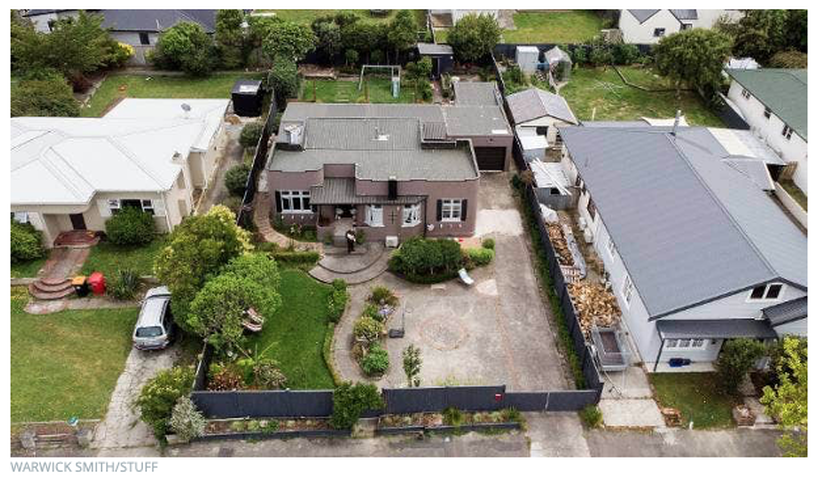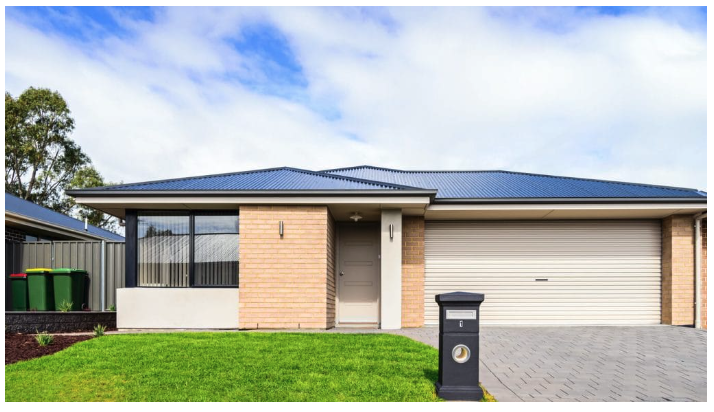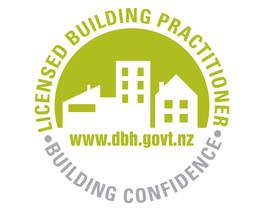Palmerston North first home buyers Trang and Kelvin Thomas discover their new home has, contrary to a real estate agent report, a leaking roof and will cost at least $45,000 to repair. The seller-supplied building report noted some dents in the roof could make water pool, and some of the cladding to roof junctions are reliant on paint to remain waterproof.  Kelvin Thomas and Trang Dong say they relied on a seller’s building report when they bought their first home, and now face a $43,000 bill for a new roof after leaks appeared months after settling. The couple, who settled on their Palmerston North home in August 2021, say they noticed the first leak about three months after settling. The leak in the garage was minor, and Thomas said the family didn’t take any action against the previous owners or real estate agents because they thought it would be an easy fix. Then in February last year, heavy rains resulted in water started dripping inside the house, he said. Kelvin said the leaks began in his daughter Emma’s bedroom, and then in the living room, and the family had to leave buckets out. “My daughter's room is leaking everywhere, she can’t sleep she’s so scared,” Dong said. “We had to move her into our bedroom.” The couple paid a handyman $900 to do remedial work when they noticed the leak in the garage, but the leaking got worse, and they paid $1300 more for repairs in March. Issues continued, and in July, the couple paid for a roofer to do an inspection. The report, by Streamline Roofing, found that the roof was in “extremely poor condition and requires a full roof replacement”. There was a significant amount of rust over the entire roof and the internal gutter, which was most likely to be leaking on to the ceiling, the report said. “Many of the nail holes are rusted, as well as missing washers, or not having the washers properly in place.” The roofer also pointed to poor workmanship in other areas of the roof, and tape that had been applied over rusted areas and holes, which would not keep water from leaking through. “At the back of the house, new iron has been installed however the iron has been cut too short, allowing water to fall behind the spouting and possibly into the wall cavity,” the report said. The family’s neighbour, Malcolm Frith, who was also a builder said he inspected the roof, and it was obvious it was in poor condition. “It was pretty obvious there was something wrong,” he said. The seller-supplied building inspection, completed by Total Home Inspection Services in April 2021, describing the roof’s condition as: “Currently performing, but maintenance is needed.” The report noted remedial work, before a full prep and paint, was a recommended long term improvement, and also recommended “discussing maintenance options with an experienced roofer”. The report stated the corrugated iron roof is “generally well sealed” but isolated repairs would be required to flashings, fixings, areas of iron, and the cap flashings before a full prep and paint. It also noted some fixing nails needed replacing, and a large internal gutter running through the centre of the house showed “varying amounts of corrosion”. “There is no evidence within the house that this is currently failing, but it needs to be checked further and most likely will need to be replaced,” the building inspection report said. The report included a photo of a section of roof that appeared to be black tarpaulin held down by two large blocks of wood, but was not mentioned in the report. The report mentioned tape repairs in places, and recommended they be removed to check if long-term repair was required. Dong said that during a mediation session between the real estate agency and building inspector, the inspector said he would help make the house watertight, but he then said he would only fix the too-short areas of roof. The building inspector declined to comment. Legal recourse for the family is limited against the inspector, because the report was in the previous owner’s name, and no legal relationship exists between the inspector and the family. Dong said she was shocked that the inspector could have missed so much, and she did not believe the law would allow a buyer to purchase a leaky home. The pair said they were advised by the real estate agents who handled the sale that they did not need to have their own property inspection done because the seller was able to provide a report. “What I’ve done wrong is I fully trusted them,” Dong says. “I thought everybody is nice and trustworthy.” The sale was handled by real estate agency Property Brokers, with agent Alex Ward and manager David Kleu named on the sale and purchase agreement. When asked whether the agents advised the customers they did not need to have their own inspection done, Kleu said Ward had left the agency, and no further comment would be given, as they had been advised the family were pursuing legal action. The previous owners, who are named in the sale and purchase agreement as Paul Dando and Dorothy Carse, were contacted via their lawyer Michael Cochrane, with questions over whether the home was known to leak at the time of sale. Cochrane said the sellers had declined to comment, and he would be making no statement. There may be other avenues for the family to pursue damages. Joanna Pidgeon, a partner at Pidgeon Law in Auckland, looked over the family’s sale agreement, and lacked any clauses that might be used by the sellers to protect themselves. Other agreements might have clauses that stated building reports provided by the vendor were for general information and due diligence purposes only, or that the buyer agreed that they bought the property based on their own investigation or inspection of the property. “The vendor has not given themselves any protection by using such a clause,” Pidgeon said. She said the family may have claims against the sellers under the Fair Trading Act, which stated no person should engage in conduct that was misleading or deceptive, or was likely to mislead or deceive, during a trade. They may also have claims under the Contract and Commercial Law Act, which allowed for damages to be awarded awarded for misrepresentation if a party had been induced to enter into the contract by a misrepresentation, whether innocently or fraudulently. Pidgeon said the family could take both the sales agents and sellers to the disputes tribunal, which could award damages up to $30,000. “By providing the incorrect building report, even if this was done innocently by the vendor, they are liable for the misrepresentation,” Pidgeon said. Pidgeon said best practice was to adviseclients to get their own building report, or to check, if one was provided, whether there were conditions limiting liability to the producer of the report. The family’s lawyer, Amanda McKenzie of Innes Dean, did not respond to requests for comment. Savvy Houz Inspections - Protect your investment call us today 021 143 2995 - www.savvyhouz.co.nz
1 Comment
1st June 2023 Dean Norrie – Savvy Houz Inspections  Do you have a routine rental inspection coming up? Don’t stress too much about it, these are normal, and inevitable if you are renting a property in New Zealand. Many tenants begin to stress about these inspections because they don’t know what to expect, and what they are expected to do. To help you be better prepared for, and stress less about, your next inspection we have created this guide. It will cover what an inspection is, why it is done, and what you should do to get ready for it. What is a rental inspection? You should expect a routine inspection to be performed regularly by the property manager or landlord. The property manager has responsibilities in regards to the property which require these inspections to be conducted. These reasons include: · Ensuring the property has been taken care of · And any maintenance/repair issues are reported. Generally, routine inspections are conducted multiple times per year. However, your property manager or landlord cannot simply show up at the property to inspect it, they are legally required to provide notice. There are also some legal guidelines regarding how often an inspection can be conducted. Why are these inspections conducted? The point of rental inspections is to determine if there are any problems within the property that may require maintenance or repairs and to ensure that the property is looked after. Your landlord is required to ensure that maintenance and repairs have been conducted and that the property is in a liveable condition. So, routine inspections are an important part of this. Routine inspections are not a test to see how tidy your house is. Generally, the inspection will include the following items: · Ensuring the property is in a clean and tidy condition. · Checking that the grounds are maintained. This will include the gardens, so checking to ensure the garden is being mowed, weeded, and watered. · Checking to see if the property has been damaged in any way. · Confirming that all who are living at the property are listed on the rental agreement. · Ensuring there are no pets beyond what has already been accepted. · Identifying any maintenance issues. During the inspection, the property manager will walk through the property and note down any problems. These will be reviewed when they return to their office. Any new damage or things that could violate the rental agreement will also be noted. You are welcome to be present during the inspection, however, this is not required. How to best prepare for an inspection. To ensure the inspection runs smoothly you should do the following before it begins: · Update your property manager if you have changed phone numbers, bank details, or email addresses. This will ensure you can communicate easily, and notify each other should any problems arise. · Keep your pets secure during the inspection. · Note any maintenance problems you notice leading up to the inspection, and report them. Follow this checklist to ensure your home is ready. There is a wide range of things you should check before the inspection. By doing so, you will be able to get the most out of your inspection and have maintenance and repairs completed. To help you out, here is a checklist you should follow. Living room. Lights. Check all your lights and make sure they are working. Look at the light fittings for loose cables and make note of any. Wipe all light switches with a cloth to remove residue or leftover fingerprints. Walls. If you notice any wear and tear cracks in the wall note these down. While they shouldn’t worry you, it is important to note these to avoid any surprise costs. You should also look along the bottom edge of the wall for any rising dampness. Floor boards Floor boards can show signs of wear and tear really easily and can be expensive to fix. Check for creaks along the floor, and see if any parts of the floorboard have begun to come up at the edges. Kitchens and bathrooms Sinks and plumbing Have a look at your taps. Make sure they aren’t dripping as a dripping tap can add unwanted costs to your utility bills. Listen for any strange sounds when you turn on the taps. Kitchen appliances and fittings Make sure your oven and stovetops are clean. These are areas your property manager will inspect. If there is any built-up grease your property manager will tell you in the inspection report. · Tiles and surfaces Give your tiles and surfaces a good scrub. Make them shine. Clean up any residual debris on your counters, sinks, mirrors, showers, and bathtubs. The toilet Don’t forget to clean your toilet! It is also a good opportunity to check around it to make sure it is all clean. The cupboards Check the hinges of your cupboards and the joins in shelves. Often these can catch food residue and grime. Bedrooms. Walls and floors Just like you did for the living room, check your walls and floors, noting any wear and tear that may need maintenance. · Windows and doors Air out the bedrooms, especially after winter where you may have kept the windows closed for a long time. Check all handles and locks to ensure they are still working. It is also a good idea to check sliding doors and windows as these can easily fall into disrepair. General clean-up While your property manager won’t poke around your bedroom, it is still a good idea to give it a once-over. Clean up rubbish, and wipe down surfaces. The exterior. Cobwebs Sweep away the cobwebs from around your property. They may be a nuisance, but they need to be cleared away. Entrance doors Ensure all locks and handles are functioning properly. This is important for your security so should be looked into. You should also check flyscreens, and wipe away dust from doors. Garage Check your garage doors and ensure they work as they were supposed to. It is also a good time to check the garage itself and ensure that it is clean. Wipe up any oil puddles or other stains. Gate and garden Take a look around your gates and fences. Ensure these are all still in working order. If they aren’t let your property manager know. Give your lawn a water and a mow, while also removing any weeds. Conclusion. A routine inspection doesn’t have to be stressful. It is often a good excuse to give the house a deeper clean than usual. Take the time to look around your house and find anything that may need maintenance or repairs. It is a good idea to let your property manager know before a routine inspection of any repairs or maintenance that may need to be conducted. This will allow them to inspect the issue during the inspection. Call Savvy Houz Inspections on 021 143 2995 |
BLOG
March 2024
Categories |
LocationLocated on Grahams Road, we are right in the centre of Christchurch, making it a lot easier on the whole for people to reach out to us for help at any time during the day. |
|







 RSS Feed
RSS Feed